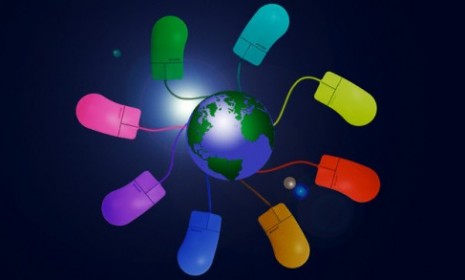Internet access: A human right?
An increasing number of nations see Internet access as a "fundamental right." Is that a stretch, or is web access truly essential?

A free daily email with the biggest news stories of the day – and the best features from TheWeek.com
You are now subscribed
Your newsletter sign-up was successful
Over the past 20 years, the Internet has fundamentally changed the way we work, live, and communicate. It has become such an integral part of daily life that nearly 80 percent of people in 26 countries, according to a recent BBC poll, believe access to the World Wide Web should be considered a basic human right. Finland and Estonia have enacted laws guaranteeing their citizens connections to the Internet, and the United Nations is pushing for universal web access. But is Internet access truly a human right — or simply a useful convenience? (Watch a Fox report about a survey on internet access)
Internet access is fundamental to 21st Century life: "The right to communicate cannot be ignored," says International Telecommunication Union secretary-general Dr Hamadoun Toure in an interview with BBC News. Governments guarantee access to "basic infrastructure" — such as "roads, waste [disposal], and water" — and they should add Internet access to the list. "We have entered the knowledge society and everyone must have access to participate."
"Internet access is a 'fundamental right'"
The Week
Escape your echo chamber. Get the facts behind the news, plus analysis from multiple perspectives.

Sign up for The Week's Free Newsletters
From our morning news briefing to a weekly Good News Newsletter, get the best of The Week delivered directly to your inbox.
From our morning news briefing to a weekly Good News Newsletter, get the best of The Week delivered directly to your inbox.
We're obviously becoming spoiled: Access to the Internet isn't a right — it's "a privilege," says Luke Appleby in New Zealand's Stuff. To understand the difference, "consider the truly impoverished and what is most important to them" — things like "the right to vote, the right to liberty and freedom from slavery or the right to elementary education." Those are rights.
A right? No. A valuable tool? Absolutely: Elevating Internet access to the status of a right does seem to "diminish" true necessities, such as access to health care, says Brian Osborne in Geek.com. "If we do that we might as well say that access to television is a fundamental right." But there's no denying that "the Internet is a vital tool" to help people obtain true rights, so in that sense it really can be useful in the pursuit of happiness.
"Is internet access a fundamental right?"
A free daily email with the biggest news stories of the day – and the best features from TheWeek.com
-
 The environmental cost of GLP-1s
The environmental cost of GLP-1sThe explainer Producing the drugs is a dirty process
-
 Greenland’s capital becomes ground zero for the country’s diplomatic straits
Greenland’s capital becomes ground zero for the country’s diplomatic straitsIN THE SPOTLIGHT A flurry of new consular activity in Nuuk shows how important Greenland has become to Europeans’ anxiety about American imperialism
-
 ‘This is something that happens all too often’
‘This is something that happens all too often’Instant Opinion Opinion, comment and editorials of the day